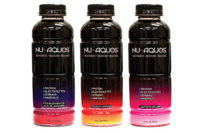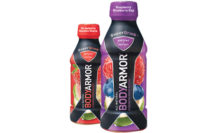Omega-3 carving its niche
Fatty acids’ future lies in nutritional beverages


|
The American Heart Association recommends consuming omega-3 fatty acids to benefit the hearts of healthy people as well as those at risk or who have cardiovascular disease. Although the association recommends eating two servings of fish a week for fatty acids, ingredient companies offer a lineup of products that help beverage-makers continue to offer another avenue for consuming polyunsaturated fats.
“The future of omega-3s in beverages is a bright one, especially in nutritional beverages,” says Ernesto Hernandez, director of process development with Houston-based OmegaPure. “Also, dairy-based beverages are proving to be an excellent provider of omega-3s.”
Hernandez states that formulating with an omega-3 ingredient can add value to a product.
“It allows the manufacturer with a marketing opportunity to include a healthy message on the food facts label,” he says. “Further, it allows the manufacturer to carry beverages with a health and wellness message and an opportunity to sell an innovative, nutritious product at a premium.”
Although omega-3 ingredients could prove beneficial on the health and wellness platform, manufacturers have different forms of omega-3s from which to choose. Sources of omega-3 fatty acids include fish oil and certain plant and nut oils. Fish oil contains both long-chain fatty acids, docosahexaenoic acid (DHA) and eicosapentaenoic acid (EPA), Hernandez says, but DHA also can be found in algae oil. Omega-3 from vegetable oils or nuts are alpha-linolenic acid (ALA), he says.
“In general, it is recognized that long-chain fatty acids are more beneficial with regards to disease prevention and infant development,” Hernandez says. “Numerous clinical trials have been conducted that evaluated the positive effects of EPA and DHA in cardiovascular disease prevention, retina and brain development and cognitive function.”
OmegaPure offers its same-named product made from menhaden oil, which contains varying sources of antioxidants that are natural or synthetic, Hernandez says. The company also is working on developing omega-3s in the form of emulsion, he adds.
Stabilizing efforts
Even though omega-3 fatty acids have received endorsements from organizations, including the U.S. Food and Drug Administration, manufacturers still are addressing issues like shelf-life and taste.
“The drawbacks can be an unpleasant consumer experience if any fish taste is present,” says Jack McCabe, director of business development group for Zymes.
Hasbrouck Heights, N.J.-based Zymes offers solubilizing and stabilizing technology for omega-3 ingredients. The company’s water-soluble Ubisol-Aqua technology allows for shelf-stable omega-3 ingredients in clear beverages. The company specializes in ingredients as delivery systems that help other ingredients work in products that are being developed, says Ken Beck, director of business development group for Zymes.
“A content claim is powerful, but there’s always been the technical drawback that a lot of these products that contain omega-3s just don’t taste good — they taste like fish or they taste foul,” Beck says. “That’s one of the reasons Zymes’ technology is so important because it allows inclusion of an ingredient in a product that tastes good and tastes stable.”
The omega-3 ingredient arena has seen an increased demand for vegan or vegetarian options. Royal DSM N.V., The Netherlands, added to its omega-3 product offerings last year when it acquired Martek Biosciences Corp, thereby adding Martek’s life’sDHA, a vegetarian DHA sourced from algae, to its lineup.
The Wright Group, Crowley, La., also offers omega-3 ingredient solutions with its Balanced Solutions line that includes omega-3
Looking for a reprint of this article?
From high-res PDFs to custom plaques, order your copy today!








